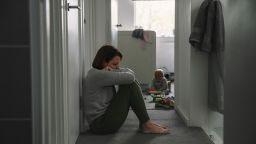Parents and caregivers are working more hours and spending more time taking care of their children than parents did in the past — all while juggling sign-ups for extracurricular activities, playdates, school forms, doctor appointments and more.
No wonder they’re stressed. And the nation’s top doctor agrees.
US Surgeon General Dr. Vivek Murthy, a father of two, issued an advisory warning on Wednesday that the pressure that parents are under has become a public health problem. Some 41% of parents reported they can’t function most days because of stress, and 48% said they’re completely overwhelmed by stress, the advisory said, citing a 2023 American Psychological Association survey.
Parents are struggling with the high costs of childcare, education and health care, the advisory warned. They’re straining to find enough time for work, childcare and the mental load of parenting. They’re worried about school shootings and the mental health challenges many children are facing.
They’re also challenged by how to handle kids’ use of social media and their own, because parents are facing an “intensifying culture of comparison” encouraged by social media influencers showing off their supposedly perfect parenting, according to the advisory.
Things are even worse for parents with added stressors, such as those who are single, have children with special needs or have recently divorced.
And if parents are stressed, kids get stressed. Children were twice as likely to have behavioral, developmental or mental disorders and four times likelier to have poor mental health when their primary caregiver had poor mental health, according to a 2021 study.
It’s no surprise that parents’ mental health struggles can hurt our whole society by driving up health care costs and lowering economic productivity, the advisory noted.
“Simply put, caregivers need care, too,” the advisory warned.

How to practice parental self-care
It’s true that lot of these problems require action by lawmakers and employers, and this advisory should serve as a wake-up call to both that health care and childcare should be more affordable and accessible.
In the meantime, what can parents do? Anna Seewald, a psychologist and host of the “Authentic Parenting” podcast, told me parents can make changes to protect their physical and mental health amid all these challenges.
Lower expectations
Our society makes life incredibly hard for parents, the advisory noted, so parents could try to reevaluate their expectations of themselves.
“Parents put a lot of pressure on themselves to always be calm and patient and have well-behaved kids who do a lot of extracurricular activities,” Seewald said, but she noted doing so often isn’t realistic. “High expectations and social comparisons lead to big resentments and frustration.”
It’s better for parents to be realistic about what they can do given their circumstances.
Take stock of how you’re spending your time
Many parents who work with Seewald are spending loads of time on social media. Even deleting a single app can free up a substantial amount of time and energy, she said. “You don’t notice how they drain your time, but that’s a background stressor for a lot of people in a world of many stressors — and it’s one that you can control.”
Parents can also benefit from simplifying their kids’ activities. “You don’t need to go to two different birthday parties for 4-year-olds in a single weekend,” she said. “Preserving and protecting your own energy and time is more important.” If it’s something you’d enjoy, “maybe you hire a babysitter for an hour, maybe you invite a neighbor over for coffee,” she said.
One way for parents to find more time for themselves is to ask for help from the community — such as asking a kind neighbor or family member to watch their kids so they can take a break. Seewald said it’s also important for parents to think through what responsibilities —such as laundry or carpooling — they can delegate to other people.
Connect in person
Part of the time parents devote to themselves needs to include connecting with other people in person, Seewald said. “So many parents feel lonely and isolated. Seeing a friend helps you vent and talk about problems and get the emotional support you need, even if it’s limited and you see one person each week,” she said.
Parents can meet some self-care needs even with their kids around — and with small pockets of time, Seewald said. “If you put on music and dance with your kids and are silly for 10 minutes before you make dinner, your mood changes because of the movement,” she said. “Little interventions like that make a big difference, and they’re free.”
Spending time in nature also helps, she said. “You can go to the backyard or to a park, even if it’s for 15 minutes, even with kids, and feel the sun or watch the sunset. There’s no cost, but it regulates the nervous system and gives you a sense of awe and connects you to something bigger,” she pointed out.
Above all, Seewald recommended that parents practice self-compassion, which means “being kind and gentle with ourselves when we make mistakes, when we yell at our kids,” she said. “Feeling inadequate and shameful is a recipe for failure.”
The surgeon general has made clear that parents in the United States are not OK. While it’s on lawmakers and employers to solve many of these problems, it’s also critical for parents to practice self-care instead of waiting for the problems to be fixed. (That’s going to take awhile). Being kind and realistic with themselves, finding time to connect with friends and nature, and asking for help are all ways to help manage the mother lode of stresses parents are under.
Kara Alaimo is an associate professor of communication at Fairleigh Dickinson University. Her book “Over the Influence: Why Social Media Is Toxic for Women and Girls — And How We Can Take It Back” was recently published by Alcove Press. Follow her on Instagram, Facebook and X.









